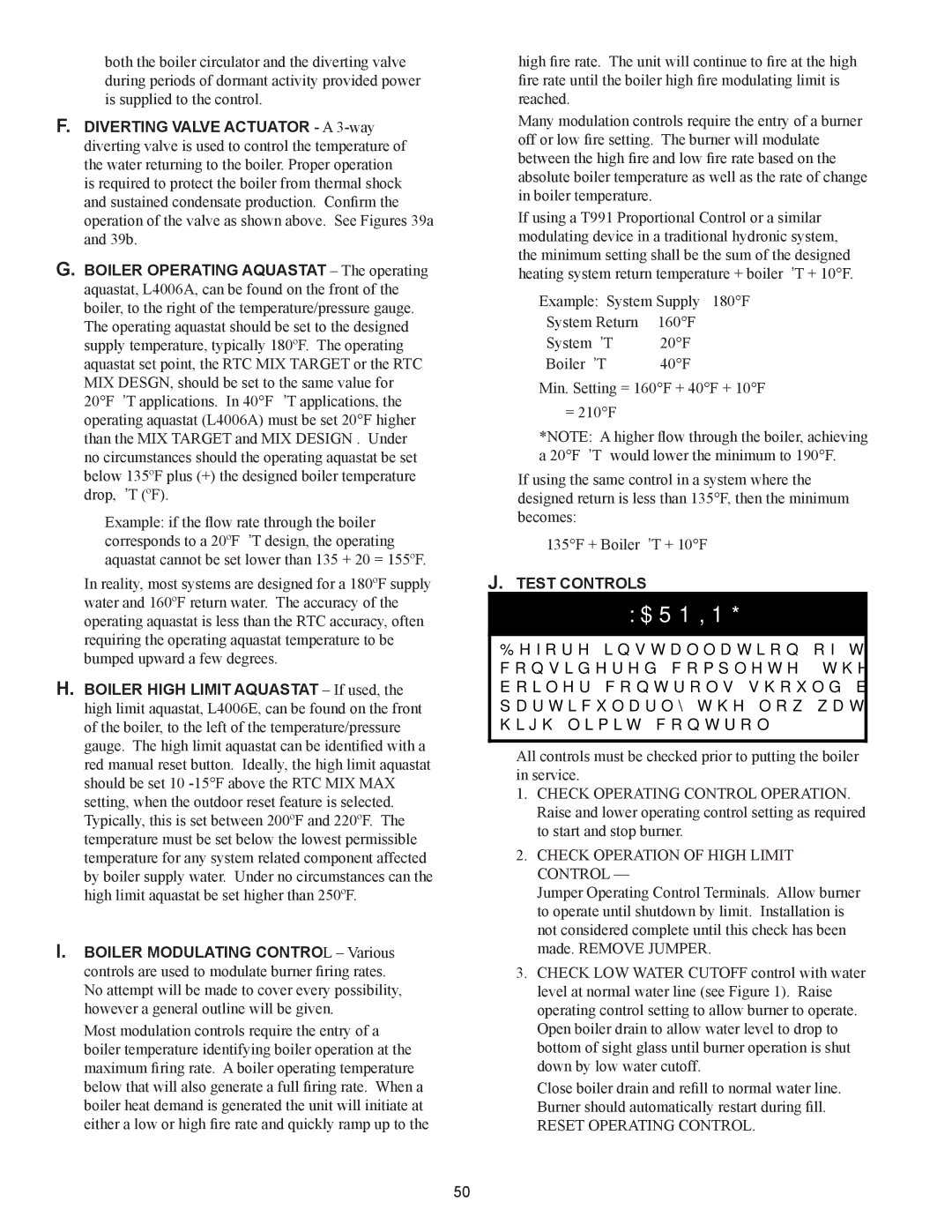
both the boiler circulator and the diverting valve during periods of dormant activity provided power is supplied to the control.
F.DIVERTING VALVE ACTUATOR - A
G.BOILER OPERATING AQUASTAT – The operating aquastat, L4006A, can be found on the front of the boiler, to the right of the temperature/pressure gauge. The operating aquastat should be set to the designed supply temperature, typically 180ºF. The operating aquastat set point, the RTC MIX TARGET or the RTC MIX DESGN, should be set to the same value for 20°F ∆T applications. In 40°F ∆T applications, the operating aquastat (L4006A) must be set 20°F higher than the MIX TARGET and MIX DESIGN . Under no circumstances should the operating aquastat be set below 135ºF plus (+) the designed boiler temperature drop, ∆T (ºF).
Example: if the flow rate through the boiler corresponds to a 20ºF ∆T design, the operating aquastat cannot be set lower than 135 + 20 = 155ºF.
In reality, most systems are designed for a 180ºF supply water and 160ºF return water. The accuracy of the operating aquastat is less than the RTC accuracy, often requiring the operating aquastat temperature to be bumped upward a few degrees.
H.BOILER HIGH LIMIT AQUASTAT – If used, the high limit aquastat, L4006E, can be found on the front of the boiler, to the left of the temperature/pressure gauge. The high limit aquastat can be identified with a red manual reset button. Ideally, the high limit aquastat should be set 10
I.BOILER MODULATING CONTROL – Various controls are used to modulate burner firing rates. No attempt will be made to cover every possibility, however a general outline will be given.
Most modulation controls require the entry of a boiler temperature identifying boiler operation at the maximum firing rate. A boiler operating temperature below that will also generate a full firing rate. When a boiler heat demand is generated the unit will initiate at either a low or high fire rate and quickly ramp up to the
high fire rate. The unit will continue to fire at the high fire rate until the boiler high fire modulating limit is reached.
Many modulation controls require the entry of a burner off or low fire setting. The burner will modulate between the high fire and low fire rate based on the absolute boiler temperature as well as the rate of change in boiler temperature.
If using a T991 Proportional Control or a similar modulating device in a traditional hydronic system, the minimum setting shall be the sum of the designed heating system return temperature + boiler ∆T + 10°F.
Example: System Supply 180°F
System Return | 160°F |
System ∆T | 20°F |
Boiler ∆T | 40°F |
Min. Setting = 160°F + 40°F + 10°F = 210°F
*NOTE: A higher flow through the boiler, achieving a 20°F ∆T would lower the minimum to 190°F.
If using the same control in a system where the designed return is less than 135°F, then the minimum becomes:
135°F + Boiler ∆T + 10°F
J.TEST CONTROLS
WARNING
Before installation of the boiler is considered complete, the operation of the boiler controls should be checked, particularly the low water cutoff and the high limit control.
All controls must be checked prior to putting the boiler in service.
1.CHECK OPERATING CONTROL OPERATION. Raise and lower operating control setting as required to start and stop burner.
2.CHECK OPERATION OF HIGH LIMIT CONTROL —
Jumper Operating Control Terminals. Allow burner to operate until shutdown by limit. Installation is not considered complete until this check has been made. REMOVE JUMPER.
3.CHECK LOW WATER CUTOFF control with water level at normal water line (see Figure 1). Raise operating control setting to allow burner to operate. Open boiler drain to allow water level to drop to bottom of sight glass until burner operation is shut down by low water cutoff.
Close boiler drain and refill to normal water line. Burner should automatically restart during fill.
RESET OPERATING CONTROL.
50
